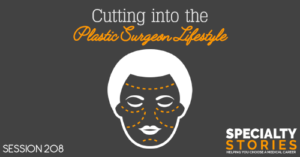Apple Podcasts | Google Podcasts
Session 208
Dr. Jenny Chen is a community-based plastic surgeon who joins me today to share her journey to her specialty, bust some myths, and talk about training path and lifestyle. Jenny specializes in both craniofacial surgery and pediatric plastic surgery.
For more podcast resources to help you with your medical school journey and beyond, check out Meded Media.
Listen to this podcast episode with the player above, or keep reading for the highlights and takeaway points.
[01:19] Interest in Plastic Surgery
Jenny initially had no concept of plastic surgery other than what you see on the media such as Botox, fillers, and breast augmentation. She went into her third year of medical school thinking she would become an infectious disease doctor. Having done a year of research at the NIH through the Howard Hughes program, she studied HIV and did her first rotations after her first year of research.
'There's an element of creativity in plastic surgery. And so if you ask 10 different plastic surgeons how are they going to reconstruct a defect, you may have 10 different answers.'Click To TweetWhat drew her to the specialty is the element of creativity and there’s this balance between reconstructive surgery and also cosmetic surgery. And to be a good reconstructive surgeon, you also have to be a cosmetic surgeon and vice versa.
[05:53] The Biggest Myths or Misconceptions Around Plastic Surgery
Jenny says you may not know what exactly is the breadth of plastic surgery. In fact, she didn’t know much until her surgical rotations. There are people who do gender confirmation, pediatric plastic surgery, hand surgery, and nerve surgery and the scope of medicine. And so, people are becoming more and more specialized.
[07:11] Traits to Becoming a Good Plastic Surgeon
As a pediatric plastic surgeon, Jenny explains that since your patients who are children are not able to articulate anything to you, it’s very important to be able to communicate with the parents.
It’s different than talking to someone who’s a fully formed adult and is making a decision for themselves. And that’s the biggest difference, otherwise, the principles of surgery are very similar.
[08:25] Types of Patients
The most commont cases are dermoid cysts or moles on the face, large congenital mivi patients who’ve had burns or hand anomalies.
They have patients with cleft lip and palate and they do a non surgical way of molding the cartilage, now becoming more and more popular. They also apply the same concept to the ears where they can mold the baby’s ear shape in the first couple of weeks of life.
She also sees cases where a child has a very small jaw resulting in difficulty of breathing. The most common surgery they do is called mandibular distraction.
[11:37] Typical Week
Jenny does clinic every Monday, Wednesday afternoons, and Thursday and operates on Tuesdays, Wednesday mornings, and Fridays.
A lot of times, patients come in just for consultation. They try to get a sense of whether this is something they have to do. For some people, that is a choice, and for other people, it’s not. And when it’s the latter, the discussion is now around what they have to do to optimize their healing.
[15:01] Taking Calls and Life Outside of the Hospital
Being in private practice, Jenny says she is always available. And so, if her patients have an issue, they can contact her anytime. This is much different from shiftwork for different other specialties, or perhaps if you’re in another practice setup. That being said, you eventually learn how to balance that over time.
Jenny adds that after you finish residency, you have much more control over your life. Life does not stop in training. It’s not just surgical training 24/7. The reason people were called residents is because you used to reside in the hospital. That’s no longer a thing since people don’t live in the hospital anymore. And so, you can have a life. You can get married, have kids, have a family, and do all of those things.
'You can do the things you want to do. You just have to be mindful about it.'Click To Tweet[20:18] The Training Path
After four years of medical school, you do plastic surgery residency. The most common plastic surgery residency is a six-year integrated plastic surgery residency. There are still other paths to plastic surgery. There’s an independent track for trainees who are coming from some other specialty, whether that’s general surgery, or ENT, which is a three-year training program. For craniofacial and pediatric plastic surgery, fellowship is one year.
[21:26] Overcoming Bias Towards DO Students
Plastic surgery is very competitive. That being said, Jenny says that what makes you stand out as an applicant to someone who does not know you are those more tangible items. They’re your board score or your publications.
If you have the opportunity to do a rotation or spend some time with plastic surgeons who are in an academic setting, that behooves you. It’s a very small specialty, relative to some of the other specialties. And so, you will find people who know people.
Hence, Jenny recommends making an impression and getting a very good letter of recommendation, especially for someone who is less competitive.
'Being a good doctor doesn't necessarily have anything to do with your Step score, or the number of publications you have.'Click To Tweet[23:04] Message to Future Pediatricians
Jenny wishes to tell our future primary care physicians, specifically pediatricians, to reach out if you have questions. As a pediatrician, the chances you’re going to encounter an issue that is very well suited for a pediatric plastic surgeon may be less common. Jenny adds that the most common thing she sees from pediatricians, number-wise, would be wounds and lacerations. And the general concepts of wound care apply.
Now, for instance, if you come across a patient who had a cleft lip and palate previously repaired, and they noticed issues with speech, just recognize that there are options. And make sure kids see their plastic surgeon or a multidisciplinary clinic.
[25:58] What She Wished She Knew Before
Jenny says that the one thing you never quite know, until you you leave training and until the patients are truly your own is that you feel a great deal of ownership for your patients. And she believes that in some ways, it’s a good thing because it makes you a better doctor. As you will do everything in your power to make sure that they do as well as possible.
Moreover, there are things you can’t control and it’s important to find a way to balance that to do as much as you can for your patients. But do it in a productive fashion so you do not get burned out.
[27:49] The Most and Least Liked Things
Jenny loves how surgery gives you immediate gratification which she thinks doesn’t exist anywhere else.
'There is an immediate gratification to surgery.'Click To TweetAnother thing unique about pediatric plastic surgery or any sort of pediatric specialty is you see kids grow and change over time.
Jenny also points out how people who are very critical of their own results and make it a point to try and improve upon that, end up being a better surgeon than someone with better hand-eye coordination.
On the flip side, what she likes the least is all the paperwork and the insurance appeals.
[35:52] Major Changes Coming to The Field
In the advent of cranial facial surgery, you had all the patients who were being born with craniofacial anomalies. Then you had all the other people that had been born over the last 30 years who had never gotten surgery. And so, there was this backlog of patients to treat. Now that is gone. Thanks to the advent of things like improved imaging, ultrasound, etc.
Also because of genetic testing, some of the congenital anomalies that patients that they used to treat are becoming less and less common.
[39:14] Final Words of Wisdom
If she had to do it all over again, Jenny says she still would have chosen the same specialty. Jenny leaves some words of encouragement to take every opportunity you can to learn about everything regardless of what it is you want to do. Ask questions and learn everything you possibly can.
Links:
IG: @jennychenmd
SEARCH SITE
LISTEN FOR FREE












